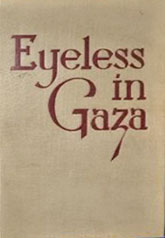Eyeless in Gaza
Critique • Quotes
 First edition
First editionFirst publication
1936
Literature form
Novel
Genre
Literary
Writing language
English
Author's country
England
Length
Approx. 143,000 words
Into the mystic
Why critics think Eyeless in Gaza is Aldous Huxley's greatest novel:
- It's very long.
- It's his most difficult novel, using a fractured timeline, so we follow several narratives that occur during Anthony Beavis's life almost simultaneously and we have to piece together the chronology and who the recurring characters are.
- It's supposedly Huxley's most autobiographical novel, tracing his own development from precocious, womanizing intellectual to mystic.
- It makes really big statements about life, reality, politics, social progress, sex...everything.
Why I don't agree Eyeless in Gaza is Huxley's greatest novel:
- It's too long. We really don't need so much detail about his youth, schoolboy intrigues and such, nor all the subplots concerning characters we don't care about.
- It's too difficult. Does the time-switching really help the reader get Huxley's ideas or does it hinder us? Well, it helps in that at least several strands of narrative—for example, one ending in 1914 with the tragic end of Beavis's childhood friend Brian, and the other involving Beavis and his friend Mark joining an insurrection in Mexico in 1934—reach climaxes at about the same time for the reader. This increases the impact of the stories. But couldn't this have been accomplished through revelations and occasional flashbacks rather than by making the entire novel a puzzle to fit together? I was constantly flipping back and forth, trying to remember who the characters were (sometimes multiple generations of them) and what relationships they held in the various time periods.
- I don't mind the really big statements about life and the universe. I appreciate them in a novel. But the ideas in Eyeless seem particularly outdated. Huxley's characters, as usual, are in the thick of intellectual conflict over the great artistic and social movements of the day. But they are largely dilettantes—affluent, highly cultured folks who play at having an interest in the concerns of the masses but always return to their sardonic homes above the fray.
Huxley, I'm sure, is sincere but it is hardly surprising his protagonist comes to the conclusion (signalled from the beginning of Eyeless and in the previous novel, Brave New World) that social progress is not possible without personal salvation first.
His resulting mysticism and pacifism, or Buddhism, was the answer of a despairing intellectual to the great social upheavals of the 1930s—economic collapse, social revolutions and the threat of world war—but were soon made to seem irrelevant in the light of the need to confront Fascism and the Holocaust. Later in the countercultural 1960s Huxley's ideas regained currency but, even then, his characters' struggles seemed somewhat outdated.
Yet there are elements of Eyeless in Gaza that do hold up. Many of the episodes among the characters are interesting and entertaining, showing the same psychological insight and satirical humour Huxley displayed in Antic Hay and Point Counter Point.
The involving sections on Anthony and Mark in Mexico near the end prove Huxley could have been a straight-ahead storyteller.
And the theme of bravery—Beavis's yielding to peer pressure in childhood and his moral cowardice as an adult contrasting to his ultimately achieved courage in defence of his pacifist convictions—is interesting and worthy.
The novel's title by the way comes from the Biblical story of Samson and Delilah in which the strongman, despite being blinded and enslaved, pulls down the Philistine temple when his hair grows back in.
— Eric
Critique • Quotes

